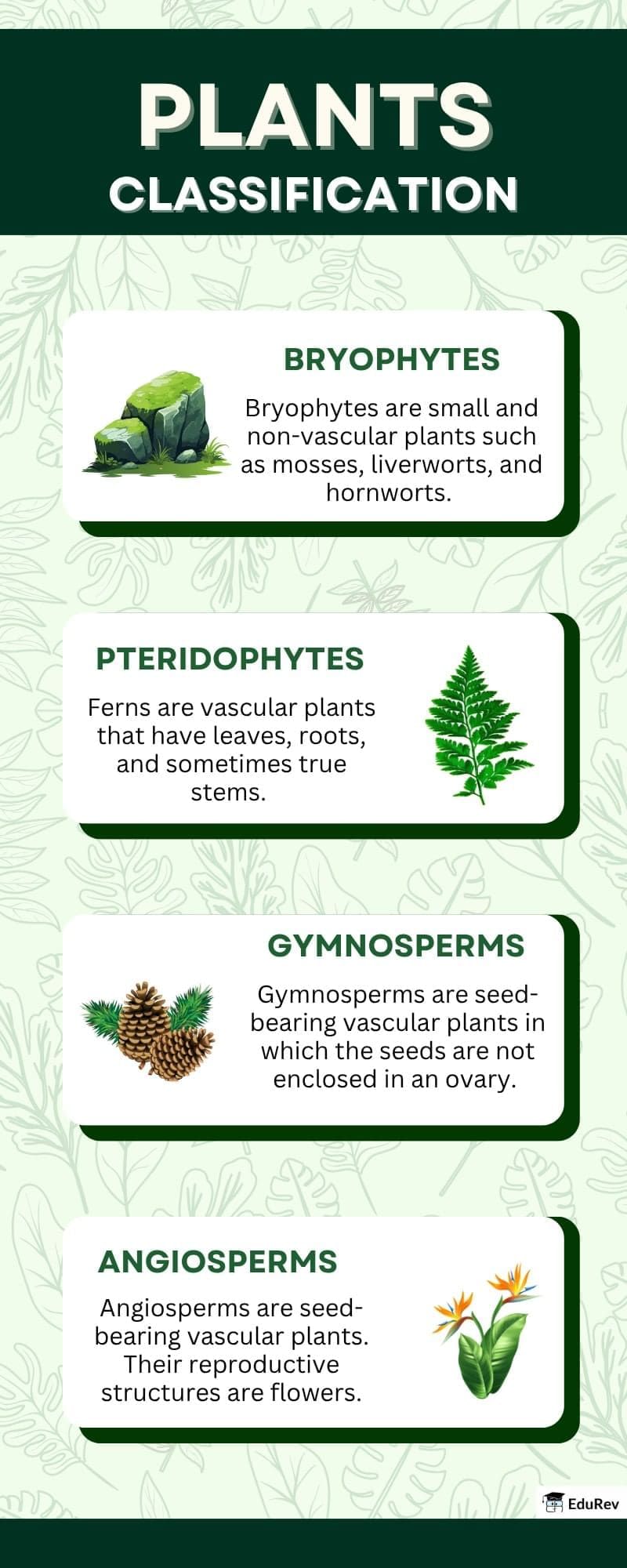NEET Exam > NEET Notes > Biology Class 11 > Infographics: Plant Kingdom Classification
Infographics: Plant Kingdom Classification | Biology Class 11 - NEET PDF Download

The document Infographics: Plant Kingdom Classification | Biology Class 11 - NEET is a part of the NEET Course Biology Class 11.
All you need of NEET at this link: NEET
|
169 videos|525 docs|136 tests
|
FAQs on Infographics: Plant Kingdom Classification - Biology Class 11 - NEET
| 1. What are the main characteristics that differentiate the major groups within the Plant Kingdom? |  |
Ans. The Plant Kingdom is primarily divided into two major groups: non-vascular plants and vascular plants. Non-vascular plants, such as mosses, lack vascular tissue and are typically small and found in moist environments. Vascular plants, which include ferns, gymnosperms, and angiosperms, have specialized tissues (xylem and phloem) for transporting water and nutrients, allowing them to grow larger and occupy a wider range of habitats. Additionally, vascular plants are further categorized based on reproductive strategies, such as seedless and seed-producing plants.
| 2. How are plants classified within the Plant Kingdom, and what criteria are used for this classification? |  |
Ans. Plants are classified based on several criteria including their structure, reproductive methods, and genetic relationships. The primary classification hierarchy includes Kingdom, Phylum, Class, Order, Family, Genus, and Species. Key characteristics used for classification include the presence of vascular tissues, type of reproduction (sexual or asexual), type of seeds (naked seeds in gymnosperms vs. enclosed seeds in angiosperms), and morphological traits such as leaf structure and growth form.
| 3. What role do gymnosperms play in the ecosystem, and how do they differ from angiosperms? |  |
Ans. Gymnosperms, such as conifers, play a crucial role in ecosystems by providing habitat and food for various organisms, contributing to soil stability, and participating in carbon cycling. They differ from angiosperms in that gymnosperms produce naked seeds that are often found in cones, while angiosperms produce seeds enclosed within fruits. Additionally, angiosperms typically have a more diverse range of forms and reproductive strategies, leading to greater biodiversity.
| 4. What are the ecological significance and uses of mosses in the environment? |  |
Ans. Mosses are ecologically significant as they help retain moisture in the environment, prevent soil erosion, and provide habitat for small organisms. They also contribute to nutrient cycling by breaking down organic matter. Furthermore, mosses are often used in gardening and landscaping for their aesthetic appeal and ability to thrive in shady, damp areas. They have also been studied for their potential in bioindicators of environmental health due to their sensitivity to pollution.
| 5. How does the classification of plants impact biodiversity conservation efforts? |  |
Ans. The classification of plants is essential for biodiversity conservation as it helps in identifying and cataloging species, understanding their relationships, and assessing their ecological roles. By categorizing plants, conservationists can prioritize efforts to protect endangered species and their habitats, develop strategies for sustainable management, and promote awareness of the importance of plant diversity. Accurate classification also aids in the restoration of ecosystems and the preservation of genetic diversity, which is crucial for resilience against environmental changes.
Related Searches





















